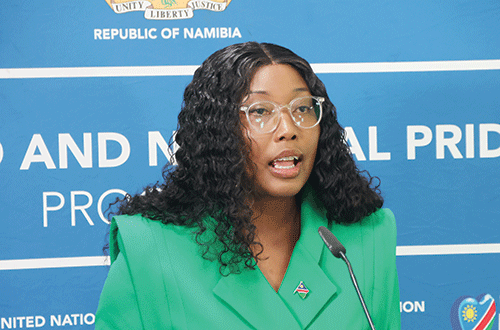Auleria Wakadumo
Satellite broadband service Starlink – owned by South African-born tech billionaire Elon Musk- has applied for a licence to offer internet services in Namibia.
Information minister Emma Theofelus, in a missive seen by New Era, gave 14 days to existing licence holders to give their comments with regards to the application for ownership requirements from Starlink Internet Service Namibia.
“All written submissions must contain the name and contact details of the person making the written submissions, and the name and contact details of the person for whom the written submissions are being made on behalf.
All written submissions must be clear and concise, and submitted electronically by electronic mail to ictstakeholders@mict.gov.na,” she noted last week. She said Starlink applied for a telecommunications service licence from the Communications Regulatory Authority of Namibia (Cran), and is 100%-foreign owned and controlled.
Starlink is a satellite internet constellation operated by Starlink Services, a wholly owned subsidiary of Musk’s SpaceX.
It delivers broadband internet beamed down from a network of roughly 500 satellites that SpaceX started launching in 2019.
Its licence will be operated under local telecommunications service provider Paratus if permission is granted.
Local internet service providers and Cran have opted to keep their cards close to their chests.
Starlink has been viewed by many as an answer to slow and expensive internet connections.
However, many countries in the globe have turned down Musk’s company.
Botswana and South Africa are among the southern African countries that rejected its application.
Several issues, including non-compliance of local ownership, were among the issues raised.
All countries require ownership in telecommunication licence seekers.
At the end of April, Starlink disconnected its service in Cameroon, following a government order.
The regulator in that country said Starlink was operating without a licence and posed a threat to national security and fair competition.
In the case of Namibia, the company stands to face a similar fate, as Namibia’s Communication Act demands “that no licence may be controlled by any person who is not a Namibian citizen or a Namibian company – and not more than 49% of the stock in any licence may be owned by persons who are not Namibian citizens”.
The minister added that Section 46 (2) of the same Act gives power to the minister to authorise the acquisition of control or ownership of stock that is prohibited by Subsection (1).
In their request for exemption in May this year, Starlink global licensing and activation manager Brandi Oliver said Starlink is building the world’s first truly global service provider with millions of subscribers all over the globe.
“As part of this, it is imperative that we maintain the same business model in every market to ensure the flexibility to move quickly and in the best interests of our customers. In each of the 108 markets where we have already been licenced, Starlink fully owns the entity holding the licences. Maintaining 100% ownership of the entity holding licences is critical for several reasons,” she said in another letter seen by this publication.
“The mission of Starlink is to enable access to meaningful highspeed – low latency internet to every corner of the Earth. It is an exciting time because as of this moment, we are technically able to provide coverage over the entirety of Namibia. This means that no matter where citizens are within your country, they will have a path to connect to the internet,” she noted.
She added that the licence will enable Starlink to deliver the highest quality product to Namibian consumers.
“Starlink has been designed as a truly global internet system that operates as one synchronised unit capable of providing a consistent and dependable service for users. The intention is for subscribers in Namibia to experience Starlink in the same way subscribers experience it in New York.
“However, to accomplish this parity of service across the world, SpaceX needs full authority over its consumer engagement. The introduction of external shareholders hinders our ability to act quickly and rapidly deploy updates to our service offerings. If we design a new product and wish to roll it out across the world simultaneously so that, for instance Namibian consumers get the latest hardware at the same time as American consumers do, we cannot be in a position where we need to seek agreement from shareholders in each jurisdiction. With over 200 telecommunications markets in the world, it would simply be unmanageable to seek consensus from multiple joint venture partners consistently. This would be such a hindrance to our business model that we would prefer not to enter markets that would impose this burden upon our ability to fairly serve all consumers,” she said.
Contacted for comment, Cran’s communications and consumer executive Mufaro Nesongano said that they cannot comment at this stage. MTC’s corporate affairs manager John Ekongo also said that they have no comment, but acknowledged that they are aware that any business that has applied, met requirements and is accepted can do business in Namibia.
-wakudumoauleria@gmail.com



